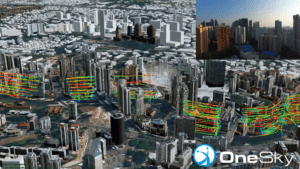 The commercial drone industry, and BVLOS drone delivery, took a big step forward last week as officials demonstrated the first working UTM prototype in Singapore. U.S. company OneSky joined global technology firm Nova Systems on the project to provide advanced unmanned traffic management capabilities in Singapore’s unique urban environment.
The commercial drone industry, and BVLOS drone delivery, took a big step forward last week as officials demonstrated the first working UTM prototype in Singapore. U.S. company OneSky joined global technology firm Nova Systems on the project to provide advanced unmanned traffic management capabilities in Singapore’s unique urban environment.
“This brings to a close a two-year consortium project, led by Nova, and co-founded as part of the UAS Call-For-Proposals (CFP) by the Ministry of Transport (“MOT”) and Civil Aviation Authority of Singapore (“CAAS”). It marks a significant milestone in Singapore’s journey towards a future driven by UAS technology, as private and government sector stakeholders look deeper into the possibility of the large-scale, integrated deployment of such technology in Singapore’s unique urban environment,” says a consortium press release.
“To conclude the trials, a UTM demonstration was held for CAAS on 10 March 2021. Using a mix of live flights and simulations, the demonstration showcased key developments and findings from the team’s work in UTM technologies over the past two years, in particular the handling of the mass deployment of drones flying Beyond Visual Line of Sight (“BVLOS”).”
In a OneSky blog post, Daniel Honaker, Head of International Implementation at OneSky explained why this demonstration of UTM functionality was different from other demonstrations around the world: in part, because Singapore is a truly unique place.
“We started by studying the infrastructure in Singapore, and understanding the airspace challenges of implementing UTM in that environment, “ said Daniel Honaker, Head of International Implementation at OneSky. “That included looking closely at issues like LTE signal strength at altitude and GNSS performance in urban canyons. We modeled the systems involved and simulated their behavior, and then tested and validated our assumptions in two sets of live trials.”
OneSky adapted their platform to the complex environment, adding the data sets that pilots need in that airspace to their interface. “Our first step was to modify and add data sets that are relevant to the low level airspace in Singapore,” Daniel explained. “That included terrain data and building data for the geospatial base layers, airspace boundaries and restricted areas provided by CAAS, and live airspace data including weather services and ship tracking (AIS) data.”
This demonstration of UTM in Singapore also went further than many previous trials. OneSky was able to trial advanced UTM operations and services including not just the identification of potential conflicts, but strategic deconfliction; dynamic rerouting; and conformance monitoring.
“Some of these concepts had been talked about, but had not actually been demonstrated at the time,” Daniel said.“ That’s where we were really able to bring innovative solutions forward for Singapore.”

Miriam McNabb is the Editor-in-Chief of DRONELIFE and CEO of JobForDrones, a professional drone services marketplace, and a fascinated observer of the emerging drone industry and the regulatory environment for drones. Miriam has penned over 3,000 articles focused on the commercial drone space and is an international speaker and recognized figure in the industry. Miriam has a degree from the University of Chicago and over 20 years of experience in high tech sales and marketing for new technologies.
For drone industry consulting or writing, Email Miriam.
TWITTER:@spaldingbarker
Subscribe to DroneLife here.







[…] extra about drones at international ports: UTM in Singapore, ship-to-shore […]